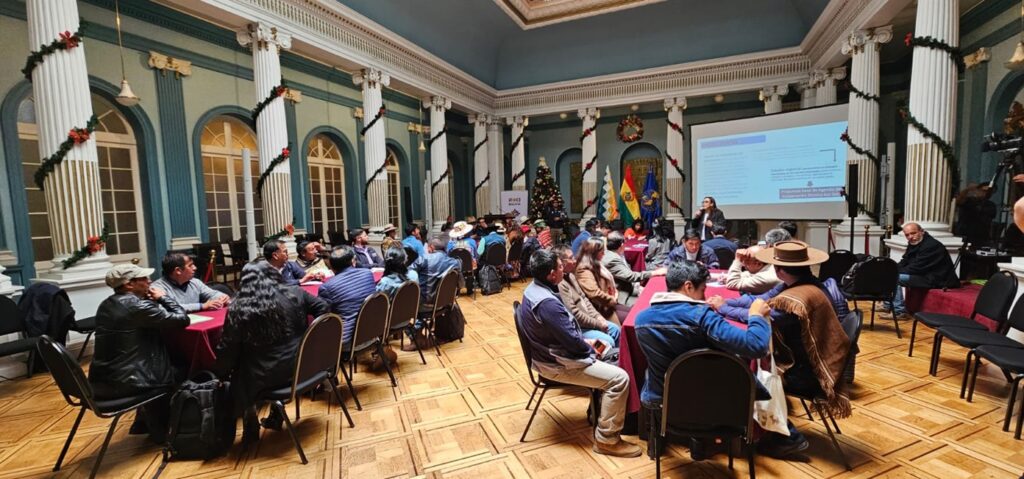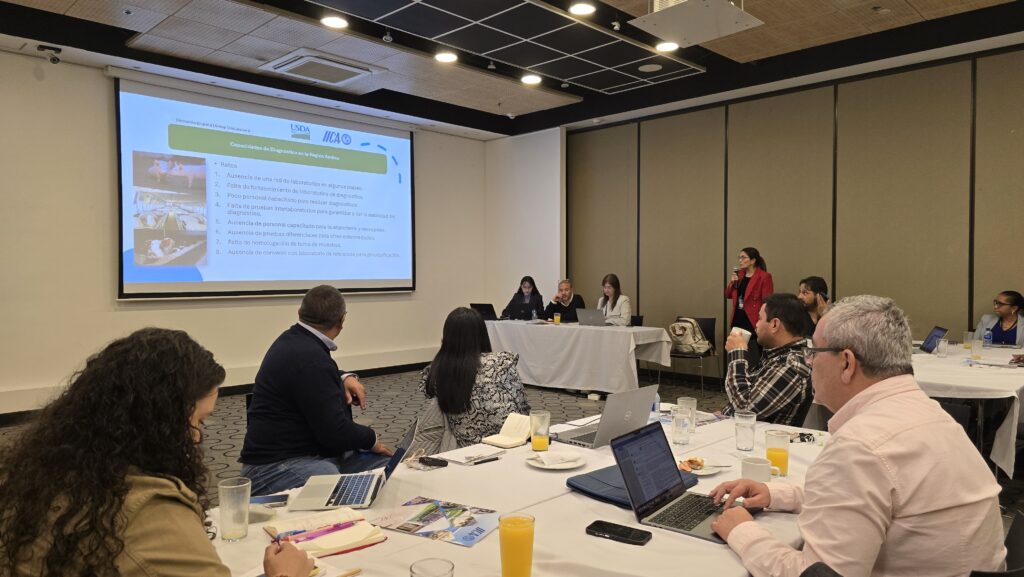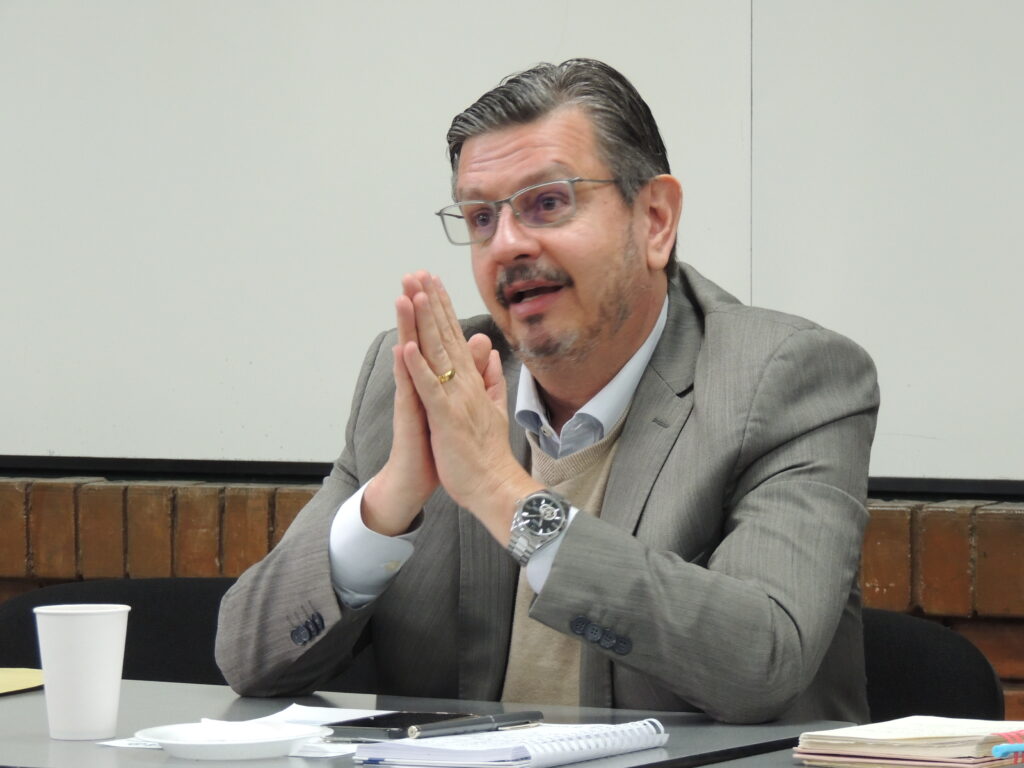El objetivo del trabajo es fortalecer los sistemas agroalimentarios de la región como proveedores de soluciones en un escenario mundial de población creciente, conflictos políticos y crisis climática. El debate tuvo lugar en el Foro de la Universidad de Columbia, escenario de eventos que suelen marcar la agenda de debate público a nivel internacional.

Nueva York, 30 de septiembre de 2024 (IICA) – La Universidad de Columbia y el Instituto Interamericano de Cooperación para la Agricultura (IICA) dieron un primer paso conjunto para elaborar nueva narrativa que destaque el valor y explique al mundo la importancia estratégica de la agricultura de América Latina para los próximos 30 años, en un contexto de desafíos globales cada vez mayores.
Un selecto grupo de expertos altamente calificados del sector público, el privado y el académico, convocados por las dos instituciones en Nueva York, discutieron la elaboración de una hoja de ruta que incluya las dimensiones de la seguridad alimentaria y nutricional, la sostenibilidad ambiental y la seguridad energética.
El objetivo del trabajo es fortalecer los sistemas agroalimentarios de la región como proveedores de soluciones en un escenario mundial de población creciente, conflictos políticos y crisis climática. El debate tuvo lugar en el Foro de la Universidad de Columbia, escenario de eventos que suelen marcar la agenda de debate público a nivel internacional.
Participaron el presidente de la República Cooperativa de Guyana, Mohammed Irfaan Ali; el Director General del IICA, Manuel Otero; Jeffrey Shaman, Decano Interino de la Escuela de Clima de Columbia, una facultad multidisciplinaria de investigación de la crisis climática; y Cynthia Rosenzweig, científica investigadora principal del Instituto Goddard de Estudios Espaciales (GISS) de la NASA e Investigadora Científica Adjunta del Centro de Investigación de Sistemas Climáticos (CCSR) de la Escuela del Clima de Columbia.
Ismahane Elouafi, Directora Ejecutiva de CGIAR; Paulo Pianez Junior, Director de Sostenibilidad y Comunicación de la brasileña Marfrig; Rubén Echeverría, Asesor Senior en Desarrollo Agrícola de la Bill & Melinda Gates Foundation; David Milestone, Director Gerente para las Américas del Instituto Tony Blair para el Cambio Global, Joao Francisco Adrien Fernandes, Jefe en el Banco Itaú de la Estrategia ESG, que hace foco en los retos sociales, ambientales y climáticos; Marcelo Brito, presidente de la Fundación Dom Cabral y director ejecutivo del Consorcio de la Iniciativa Amazónica; y los investigadores de la Universidad de Columbia Walter Baethgen y Glenn Denning, también fueron protagonistas de la discusión.
El debate fue coordinado por Izabella Teixeira, ex ministra de Medio Ambiente de Brasil y Asesora Especial del IICA para el G20 y las COP 29 y 30.
La iniciativa refleja la preocupación de la Universidad de Columbia y el IICA por consolidar una visión real de la posición de América Latina como proveedor mundial de alimentos y de servicios ecosistémicos, por su vasto patrimonio de recursos naturales, y su marco institucional de promoción de innovación y nuevas tecnologías.
El abordaje de la interacción entre agricultura, cambio climático y pérdida de biodiversidad, así como está generando nuevas políticas públicas en el mundo, requiere también de una nueva narrativa que favorezca el uso más eficiente de los recursos, la disminución de las emisiones de gases de efecto invernadero, mayor resiliencia y mayor productividad.
“Creando una nueva narrativa para la agricultura en América Latina – Sistemas Agroalimentarios eficientes en el uso de los recursos para la salud de las personas y el planeta” fue el título de la jornada, que se desarrolló en paralelo a la realización en Nueva York de la Asamblea General de las Naciones Unidas y la Semana del Clima.
Fue una discusión fértil en la que se definieron los lineamientos de un primer documento que reflejará la alianza entre la Universidad de Columbia y el IICA, destinada a iluminar el verdadero aporte del agro de la región a la seguridad alimentaria y también al equilibrio ambiental y la estabilidad social global.
En ese sentido, el presidente Irfaan Ali planteó que se deben superar las visiones de la agricultura tradicional y poner el acento en el vínculo entre producción y preservación de la biodiversidad, en una nueva narrativa que incluya a los jóvenes y a las mujeres como actores fundamentales de un sector que contribuye al bienestar de las personas y al desarrollo económico de los países.
Manuel Otero coincidió con ese punto de vista y consideró que “hoy sobrevive una vieja narrativa que no refleja la realidad que se vive en las zonas rurales de América Latina y se caracteriza por mostrar una agricultura de commodities, extractiva, muy primarizada, en la que lo cuantitativo es más importante que lo cualitativo”.
El Director General del IICA se refirió también “a la importancia de conectar a los productores con los consumidores, en una visión debe superar los límites tradicionales de la agricultura y dirigirse al conjunto de la sociedad”.

La construcción de la hoja de ruta de la nueva narrativa incluye interacción con gobiernos, industria y sociedad civil en los foros globales más importantes de discusión política y ambiental.
La primera escala será en noviembre, con la Conferencia de las Naciones Unidas sobre Cambio Climático (COP 29) a celebrarse en Azerbaiyán, donde el IICA estará presente con un pabellón para mostrar la realidad de la agricultura del continente. Y habrá un hito fundamental el año próximo, cuando el escenario de la COP 30 será Brasil.
Cambio climático y barreras comerciales
“Estamos poniendo en marcha un diálogo para identificar lo que tenemos en común en los países latinoamericanos y los desafíos que enfrentamos, teniendo en cuenta dos cuestiones importantes. En primer lugar, que ya estamos viviendo una crisis climática y una crisis de la naturaleza, que se hace evidente con sequías e inundaciones prolongadas. Por otro lado, hay un proceso creciente de aparición de barreras no arancelarias en el comercio internacional relacionadas con el tema ambiental”, dijo Teixeira.
La Asesora Especial del IICA consideró que la nueva narrativa también debe apuntar a brindar conocimientos a las personas para que salgan del antagonismo entre producción y ambiente. Se debe poner en primer plano el papel irreemplazable de la agricultura de América Latina en un contexto de inestabilidad internacional, de debilitamiento de las normas comerciales multilaterales y de debate sobre el uso de la tierra, la deforestación, la captura de carbono y la restauración de los ecosistemas.
El investigador de la Universidad de Columbia Walter Baethgen puso el acento en el tamaño del desafío. “Cuando construimos una nueva narrativa la pregunta es, ¿A quién le hablamos? ¿Cuál es la realidad sobre el conocimiento que nuestras sociedades cada vez más urbanas tienen sobre lo que es la agricultura? El desafío es muy grande porque sabemos que la población, incluso en países que son grandes productores agropecuarios, falta conciencia sobre la importancia de esto. El reto es enorme. Hay que construir la nueva narrativa y hacerla llegar”, indicó.
Los participantes coincidieron en que la ciencia y la innovación deben jugar un rol primordial ante las nuevas exigencias del comercio y también de los consumidores, en cuanto a alimentos saludables.
La cuestión de la salud, el reto de los nuevos hábitos alimentarios, los nuevos estilos de vida, las exigencias sanitarias y presiones adicionales que surgen como resultado de los movimientos migratorios asociados al cambio climático y a los conflictos armados también son temas que no deben ser soslayados.
Más información:
Gerencia de Comunicación Institucional
comunicacion.institucional@iica.int










